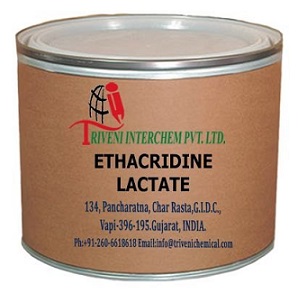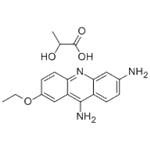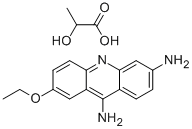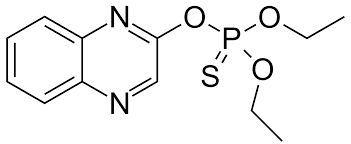Ethacridine lactate: Chemical properties; Uses
Ethacridine lactate is yellow crystalline powder with bitter taste and no odor. Dissolved in water, easy to be soluble in hot water, slightly soluble in ethanol, insoluble in ether.

Ethacridine lactate, also known as rivanol, is a basic dyestuff based on acridine and the most effective antiseptic in dyestuffs. The base group has no antibacterial activity before it dissociates into a positive ion. When it dissociates into ethacridine and has a positive charge on its basic nitrogen group, it exerts the greatest antibacterial effect on Gram-positive bacteria. It has a strong effect on various suppurative bacteria. The antibacterial activity is related to the pH of the solution and the dissociation constant of the drug. Rinse with 0.1% to 0.3% aqueous solution or wet with dipping gauze to treat wound infection of skin and mucous membranes. No damage has been found to the tissue at the therapeutic concentration, and the antibacterial effect was slowly shown, but the drug could be firmly adsorbed on the mucosa and the wound surface, and the effect can be maintained for one day. When it is used as organics, the activity is enhanced.
Reference
Dikshith, T. S. S. 1996. Safety evaluation of environmental chemicals. New Delhi: New Age International Publishers (formerly Wiley Eastern Ltd.).
Organization for Economic Co-operation and Development (OECD). 1999. Guidance document on humane endpoints for experimental animals used in safety evaluation studies. Paris: OECD.
Steven, G. G. 2004. A small dose of toxicology: The health effects of common chemicals. Boca Raton, FL: CRC Press.
Ethacridine lactate is yellow crystalline powder with bitter taste and no odor. Dissolved in water, easy to be soluble in hot water, slightly soluble in ethanol, insoluble in ether.

Ethacridine lactate, also known as rivanol, is a basic dyestuff based on acridine and the most effective antiseptic in dyestuffs. The base group has no antibacterial activity before it dissociates into a positive ion. When it dissociates into ethacridine and has a positive charge on its basic nitrogen group, it exerts the greatest antibacterial effect on Gram-positive bacteria. It has a strong effect on various suppurative bacteria. The antibacterial activity is related to the pH of the solution and the dissociation constant of the drug. Rinse with 0.1% to 0.3% aqueous solution or wet with dipping gauze to treat wound infection of skin and mucous membranes. No damage has been found to the tissue at the therapeutic concentration, and the antibacterial effect was slowly shown, but the drug could be firmly adsorbed on the mucosa and the wound surface, and the effect can be maintained for one day. When it is used as organics, the activity is enhanced.
Reference
Dikshith, T. S. S. 1996. Safety evaluation of environmental chemicals. New Delhi: New Age International Publishers (formerly Wiley Eastern Ltd.).
Organization for Economic Co-operation and Development (OECD). 1999. Guidance document on humane endpoints for experimental animals used in safety evaluation studies. Paris: OECD.
Steven, G. G. 2004. A small dose of toxicology: The health effects of common chemicals. Boca Raton, FL: CRC Press.
You may like
Related articles And Qustion
See also
Lastest Price from 6,9-DIAMINO-2-ETHOXYACRIDINE LACTATE manufacturers

US $0.00/kg2025-09-18
- CAS:
- 1837-57-6
- Min. Order:
- 1kg
- Purity:
- 98%
- Supply Ability:
- Customise

US $10.00/KG2025-04-21
- CAS:
- 1837-57-6
- Min. Order:
- 100KG
- Purity:
- 99%
- Supply Ability:
- 100 mt


